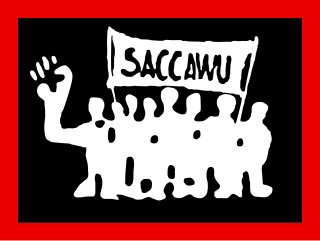Related Research Articles

The World Federation of Trade Unions (WFTU) is an international federation of trade unions established in 1945. Founded in the immediate aftermath of World War Two, the organization built on the pre-war legacy of the International Federation of Trade Unions as a single structure for trade unions world-wide, following the World Trade Union Conference in London, United Kingdom.

The South African Commercial, Catering and Allied Workers Union (SACCAWU) is a trade union representing retail, distribution and hospitality workers in South Africa.
Die Spoorbond was an Afrikaner railway trade-union formed in 1934 by H. J. Klopper, founder of the Afrikaner Broederbond, which advocated a policy of replacing all black railway-workers with Afrikaners. It rejected strikes and called instead for loyal service to the South African Railways and Harbours Administration (SARHA). The union had a membership of some 16,000 in the 1930s, considerably more than that of its rival, the National Union of Railway and Harbour Servants, which was forced to dissolve in 1937.
The South African Congress of Trade Unions (SACTU) was a national trade union federation in South Africa.
The Trade Union Council of South Africa (TUCSA) was a national trade union federation in South Africa.
The Hotel and Restaurant Workers' Union (HARWU) was a trade union representing hospitality workers in South Africa.
The National Union of Furniture and Allied Workers (NUFAW) is a trade union representing workers in the furniture industry in South Africa.
HOTELICCA is a general union in South Africa.
The Salaried Staff Association (SALSTAFF) was a trade union representing railway workers in South Africa.
The National Union of Distributive Workers (NUDW) was a trade union representing workers involved in retail and goods transport in South Africa.
The Co-ordinating Council of South African Trade Unions (CCSATU) was a national trade union federation of white workers in South Africa.
The South African Federation of Trade Unions (SAFTU) was a national trade union federation of workers representing workers in South Africa.
The South African Footplate Staff Association (SAFSA) was a trade union representing white railway workers in South Africa.
The Federal Consultative Council of South African Railways and Harbours Staff Associations (FCC) was a national trade union federation bringing together unions representing white railway workers in South Africa.
The Furniture Workers' Industrial Union (FWIU) was a trade union representing workers involved in making furniture in South Africa.
The Durban Indian Municipal Employees' Society (DIMES) was a trade union representing municipal workers of Indian origin, in Durban in South Africa.
The South African Reduction Workers' Association (SARWA) was a trade union representing officials involved in processing mining ores in South Africa.
The South African Engine Drivers' and Firemen's Association (SAEDFA) was a trade union representing people involved in operating engines in South Africa.
The South African Equity Workers' Association (SAEWA) is a general union in South Africa.
The Motor Industry Employees' Union was a trade union representing workers involved in vehicle building in South Africa.
References
- ↑ Alexander, Peter (2000). Workers, War & the Origins of Apartheid. J. Currey. ISBN 9780852557655.
- ↑ Lewis, Jon (1984). Industrialisation and Trade Union Organization in South Africa, 1924-1955. Cambridge: Cambridge University Press. ISBN 0521263123.
- ↑ Wirtz, W. Willard (1962). Directory of Labor Organizations: Africa. Washington DC: Bureau of International Labor Affairs. pp. 37.14–37.25.
- ↑ Miller, Shirley (1982). Trade Unions in South Africa 1970-1980: a directory and statistics. Cape Town: Southern Africa Labour and Development Research Unit. ISBN 0799204692.
- ↑ Kraak, Gerald (1993). Breaking the Chains. London: Pluto Press. ISBN 0745307051.
- ↑ Horwitz, Allan. "HARWU: The Aborted Attempt to Build a National South African Catering Union (1984 – 1990) by Allan Horwitz, June 2018". South African History Online. Retrieved 15 March 2021.
- ↑ "Affiliated trade unions". FEDUSA. Retrieved 16 March 2021.